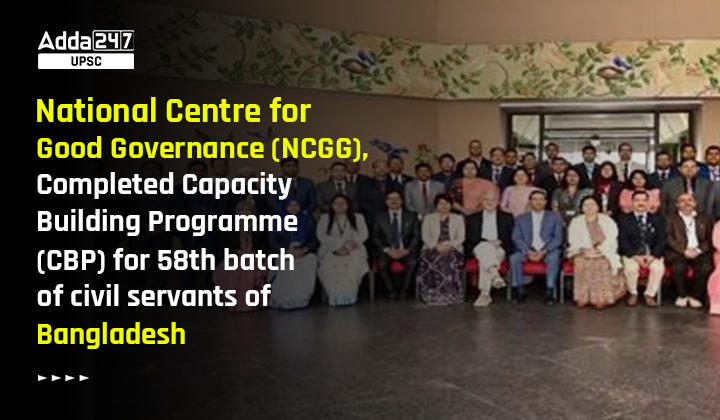Table of Contents
National Centre for Good Governance (NCGG): set up in 2014, National Centre for Good Governance (NCGG) is a top-level organization under the Ministry of Personnel, Public Grievances & Pensions. National Centre for Good Governance (NCGG) is also important for UPSC Prelims Exam 2023 and UPSC Mains Exam ( GS Paper 2- various governance initiatives taken by government; International relations, India-Bangladesh Bilateral Relations).
National Centre for Good Governance (NCGG) in News
Recently, the National Centre for Good Governance (NCGG) completed its flagship capacity building programme (CBP) for 58th batch of civil servants of Bangladesh.
NCGG’s Capacity Building Programme (CBP)
The aim of the Capacity Building Programme (CBP) was to equip officers with the latest knowledge in areas such as public policies, governance, technology utilization, and new skill sets.
- The objective of NCGG’s Capacity Building Programme (CBP) was to enable them to design and implement effective public policies and programs, ultimately enhancing the quality of life for citizens.
- The Capacity Building Programme (CBP) of National Centre for Good Governance (NCGG) was attended by 45 officers of 58th batch of civil servants of Bangladesh.
- So far, with the support of MEA and in close cooperation with the Indian Mission in Dhaka, NCGG has trained about 2,055 civil servants of Bangladesh.
Foundation of National Centre for Good Governance (NCGG)
The National Centre for Good Governance traces its origin to the National Institute of Administrative Research (NIAR).
- NIAR was set up in 1995 by the Lal Bahadur Shastri National Academy of Administration (LBSNAA) the Government of India’s apex training Institute for higher civil services.
- During its 19 years of existence it provided research and training support to the Academy in areas of public administration.
- NIAR was subsequently rechistened with an expanded mandate, as National Centre for Good Governance, which was inaugurated on February 24th, 2014.
What is National Centre for Good Governance (NCGG)?
The National Centre for Good Governance (NCGG) is an autonomous institute under the aegis of Department of Administrative Reforms and Public Grievances, Government of India.
- Headquarter: NCGG head office is at New Delhi and branch office at Mussoorie.
- Mandate: The NCGG has been set up to assist in bringing about governance reforms through studies, training, knowledge sharing and promotion of good ideas.
- Key functions: NCGG seeks-
- To carry out policy relevant research and prepare case studies;
- Curate training courses for civil servants from India and other developing countries;
- Provide aplatform for sharing of existing knowledge and
- Pro-actively seek out and develop ideas for their implementation in the government, both at the National and International Level.
National Centre for Good Governance (NCGG) Key Objectives
Important objectives of the National Centre for Good Governance (NCGG) are listed below-
- To be a think tank for governance & policy reforms, cutting across administrative, social, economic and financial spheres;
- To function as a national repository on information on best practices, initiatives and methodologies that promote Good Governance, e-Governance, innovation & change management within the government;
- To initiate and participate in action research and capacity building on various aspects of regulatory and development administration, public policy, governance and public management at National/State & local levels;
- To advise on key issues in governance and develop synergy across various Ministries/ Departments of GoI, and State Governments;
- To promote sharing and replication of innovative ideas and best practices in Governance;
- To interact with national and international organizations, in and outside government, engaged in research and capacity building in the above spheres;
- To engage in provision of consultancy services in and outside the country.
25th National Conference on e-Governance (NCeG) to be held in Katra, Jammu & Kashmir
25th National Conference on e-Governance (NCeG) to be held in Katra, Jammu & Kashmir



 TSPSC Group 1 Question Paper 2024, Downl...
TSPSC Group 1 Question Paper 2024, Downl...
 TSPSC Group 1 Answer key 2024 Out, Downl...
TSPSC Group 1 Answer key 2024 Out, Downl...
 UPSC Prelims 2024 Question Paper, Downlo...
UPSC Prelims 2024 Question Paper, Downlo...




